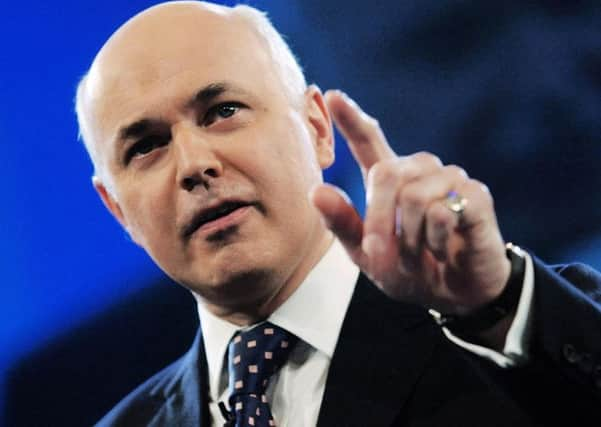Observations with Richard Beecham: Fixing the nation – or a race to the bottom?


“You see ’em, don’t you?” his mouth would rasp, in-between gnaws on a family-size shepard’s pie. “They walk around with fags in their mouths and fifteen pushchairs, and call their kids names like ‘McKenzie Calvin Klein’.”
Every lunchtime would be peppered with his interesting, yet ill-informed rants against a sub-section of society that I suspected didn’t really exist.
Advertisement
Hide AdAdvertisement
Hide Ad“Scroungers!” he would conclude, having moved onto an entire Sara Lee gateaux.
The man – let’s call him ‘Sean’ – was something of a trailblazer. As a lad in my early twenties, I soon learned more and more that Sean’s attitude was taking over.
This came to a head this week when work and pensions secretary Iain Duncan Smith did a “Sean” of his own, during a speech on his welfare reforms.
He said: “The scale of the change has been enormous – but we are delivering, and it is changing our country for the better.”
Advertisement
Hide AdAdvertisement
Hide AdCutting benefits is helping you. Going hungry will make you work. Jobs are out there – you are lazy.
This attitude is one that, weirdly, people seem only too happy to buy into. “We deserve it. We’re rubbish.”
And it is those who live their lives on benefits who now seem to act as lightning rods for hatred, as many people view them as undeserved recipients of money the country can ill afford.
There was no better example of this than Channel 4’s Benefits Street, and the subsequent backlash against some of the people that featured in it.
Advertisement
Hide AdAdvertisement
Hide AdFollowing the programme’s ratings success, White Dee was then made a defacto spokesperson for ‘Benefits Britain’ (something I’m sure she was absolutely thrilled about).
She surprised people. Turns out Dee was reasonably intelligent, and spoke more lucidly on difficult subjects than many of the Katie Hopkins breed of professional prejudice peddlers.
As I’ve said here before, successive Labour and Tory Governments have turned much more of a blind eye (does that metaphor make sense?) to the possibility of pension reforms, despite state pensions making up the rump, ribs and tripe of Britain’s sinking welfare spending. Wouldn’t want any cabinet ministers losing their seats now, would we?
From this it is easy to conclude that benefits cuts are much more to do with ideology than cost-cutting, but is this really true?
Advertisement
Hide AdAdvertisement
Hide AdAfter all, the Office for National Statistics said there were 30.64 million people in work as of May this year – that’s 254,000 more than for December 2013 to February 2014 and 929,000 more than a year earlier.
Surely this is reason to celebrate? But the nature of employment itself seldom gets scrutinised.
I have lost count, quite literally, of the number of people I speak to working zero-hours contracts with no job security. It is generally accepted that there is “no money anymore”, so let’s be thankful for a job.
In his masterpiece The Ragged Trousered Philanthropists, Robert Tressell spoke of: “The blind, stupid, enthusiastic admiration displayed by the philanthropists for those who exploited and robbed them; their extraordinary apathy with regard to their own interests; the patient, broken-spirited way in which they endured their sufferings, tamely submitting to live in poverty in the midst of the wealth they had helped to create; their callous indifference to the fate of their children, and the savage hatred they exhibited towards anyone who dared to suggest the possibility of better things.”
This was written over a hundred years ago. We can only hope that, sooner or later, people will begin to stand up for themselves once more.